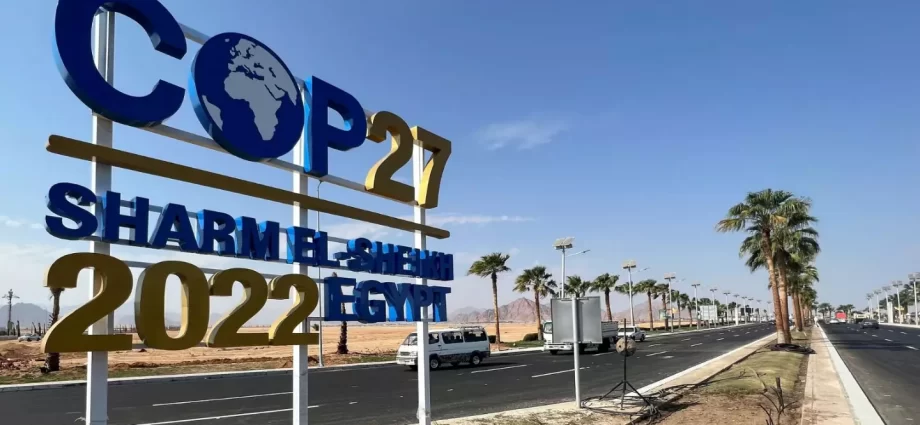By REUTERS – COP 27 EGYPT
Big business more than ever is under pressure to channel money into curbing climate change – and yet the chances of UN talks providing the necessary spur have slimmed as the Ukraine war, high energy prices and geopolitical tensions take precedence.
In interviews, more than a dozen US and European finance leaders were pessimistic the climate conference in Sharm el-Sheikh in Egypt starting November 6 can make clear progress.
What they want are signals on the pace of regulation that would allow company boards to plan their climate policy.
But as governments have lately been distracted by world events, they fear countries will fail to provide any major new commitments.
“Geopolitical relations going into COP27 are at one of the worst levels in recent history,” said Luke Sussams, head of ESG and Sustainable Finance, EMEA at Jefferies.
“The age-old dilemma of climate finance, facilitated between the developed and the developing world, will of course be critical. We, I don’t think, are too optimistic that many resolutions will be met in that regard.”
A UN report published in October underlined the urgency of the climate problem and that emissions must drop 43 percent by the end of the decade to prevent the worst impacts of a hotter planet.
The best hope could be to prevent the progress so far being undone.
“Avoiding a rollback of existing pledges and commitments… could probably be considered a success,” Benedict Buckley, research analyst at ClearBridge Investments, said.
Many companies made pledges to cut emissions last year, but like many governments, they have yet to work out how those will be implemented.
More than 550 financial firms are members of the Glasgow Financial Alliance for Net Zero, aiming to cut their emissions and push companies in the real economy that rely on their financing to do the same, but the pace of action has been slow.
Not enough done
“The reality is that not enough has been done in the last 12 months – some would argue we have moved backwards,” said Hortense Bioy, Global Director of Sustainability Research at Morningstar.
The biggest disruption since last year’s Glasgow climate talks has been the invasion of Ukraine by Russia, a major oil and gas exporter.
Europe in particular has been forced to rethink its previous reliance on Russian gas and to seek alternatives. In the short term that includes coal, undermining a deal the UN summit in Glasgow to phase out its use. However, as this year’s high oil and gas prices have rewarded those producing fossil fuels.
By Ross Kerber and by Simon Jessop
Share this news
This Year’s Most Read News Stories

Mbeto on Mwinyi: He created today’s affluent people
The CCM Secretary of Ideology and Publicity (Zanzibar), Mr Khamis Mbeto Khamis, said the late President Ali Hassan Mwinyi was the architect of the current class of affluent people.Continue Reading

Tanzania Confirms Second Marburg Outbreak After WHO Chief Visit
Dar es Salaam — Tanzania’s President Samia Suluhu Hassan has declared an outbreak of Marburg virus, confirming a single case in the northwestern region of Kagera after a meeting with WHO director-general Tedros Adhanom Ghebreyesus.
The confirmation follows days of speculation about a possible outbreak in the region, after the WHO reported a number of deaths suspected to be linked to the highly infectious disease.
While Tanzania’s Ministry of Health declared last week that all suspected cases had tested negative for Marburg, the WHO called for additional testing at international reference laboratories.
“We never know when an outbreak might occur in a neighbouring nation. So we ensure infection prevention control assessments at every point of care as routine as a morning greeting at our workplaces.”Amelia Clemence, public health researcher
Subsequent laboratory tests conducted at Kagera’s Kabaile Mobile Laboratory and confirmed in Dar es Salaam identified one positive case, while 25 other suspected cases tested negative, the president told a press conference in Dodoma, in the east of the country today (Monday).
“The epicentre has now shifted to Biharamulo district of Kagera,” she told the press conference, distinguishing this outbreak from the previous one centred in Bukoba district.
Tedros said the WHO would release US$3 million from its emergencies contingency fund to support efforts to contain the outbreak.
Health authorities stepped up surveillance and deployed emergency response teams after the WHO raised the alarm about nine suspected cases in the region, including eight deaths.
The suspected cases displayed symptoms consistent with Marburg infection, including headache, high fever, diarrhoea, and haemorrhagic complications, according to the WHO’s alert to member countries on 14 January. The organisation noted a case fatality rate of 89 per cent among the suspected cases.
“We appreciate the swift attention accorded by the WHO,” Hassan said.
She said her administration immediately investigated the WHO’s alert.
“The government took several measures, including the investigation of suspected individuals and the deployment of emergency response teams,” she added.
Cross-border transmission
The emergence of this case in a region that experienced Tanzania’s first-ever Marburg outbreak in March 2023 has raised concerns about cross-border transmission, particularly following Rwanda’s recent outbreak that infected 66 people and killed 15 before being declared over in December 2024.
The situation is particularly critical given Kagera’s position as a transport hub connecting four East African nations.
Amelia Clemence, a public health researcher working in the region, says constant vigilance is required.
“We never know when an outbreak might occur in a neighbouring nation. So we ensure infection prevention control assessments at every point of care as routine as a morning greeting at our workplaces.”
The Kagera region’s ecosystem, home to fruit bats that serve as natural reservoirs for the Marburg virus, adds another layer of complexity to disease surveillance efforts.
The virus, closely related to Ebola, spreads through contact with bodily fluids and can cause severe haemorrhagic fever.
Transparency urged
Elizabeth Sanga, shadow minister of health for Tanzania’s ACT Wazalendo opposition party, says greater transparency would help guide public health measures.

Sign up for free AllAfrica Newsletters
Get the latest in African news delivered straight to your inbox
“This could have helped to guide those who are traveling to the affected region to be more vigilant and prevent the risk of further spread,” she said.
WHO regional director for Africa Matshidiso Moeti says early notification of investigation outcomes is important.
“We stand ready to support the government in its efforts to investigate and ensure that measures are in place for an effective and rapid response,” she said, noting that existing national capacities built from previous health emergencies could be quickly mobilised.
The situation coincides with leadership changes in Tanzania’s Ministry of Health, with both the chief medical officer and permanent secretary being replaced.
This piece was produced by SciDev.Net’s Sub-Saharan Africa English desk.
Source: allafrica.com

Zanzibar airport operators decry job losses over Dubai deal
Tanzania air operators say over 600 workers are set to lose their jobs after the semi-autonomous government of Zanzibar awarded a Dubai-based company exclusive rights to handle ground services at a refurbished airport.
The Tanzania Air Operators Association (Taoa) said in a statement that the contract awarded to Dnata, which is registered at the London Stock Exchange, was in breach of the law banning any company from having exclusive rights to ground-handling services at major airports.Continue Reading











